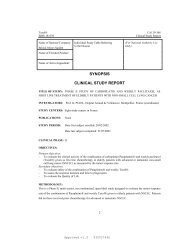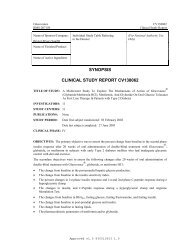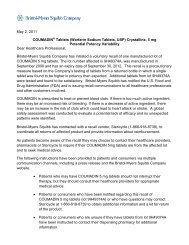Understanding chronic hepatitis B - Bristol-Myers Squibb
Understanding chronic hepatitis B - Bristol-Myers Squibb
Understanding chronic hepatitis B - Bristol-Myers Squibb
You also want an ePaper? Increase the reach of your titles
YUMPU automatically turns print PDFs into web optimized ePapers that Google loves.
Commonly asked questions<br />
after being diagnosed with<br />
<strong>chronic</strong> <strong>hepatitis</strong> B (CHB):<br />
If I do not have any symptoms, do I need<br />
to see my doctor<br />
Some people may not feel symptoms of CHB.<br />
By visiting your doctor regularly, your condition can<br />
be monitored to find out how the virus has affected<br />
your liver. There are several ways your doctor can<br />
monitor your condition, including a simple blood<br />
test to check your <strong>hepatitis</strong> B viral load.<br />
If you ignore your<br />
<strong>chronic</strong> <strong>hepatitis</strong> B,<br />
will it ignore you<br />
Do I need to worry about my condition<br />
becoming worse if I lead a healthy lifestyle<br />
Chronic <strong>hepatitis</strong> B is a serious infection caused<br />
by the <strong>hepatitis</strong> B virus. Leading a healthy lifestyle<br />
is important, but you also need to work with your<br />
doctor to manage your condition. Your doctor may<br />
recommend treatment even if you lead a<br />
healthy lifestyle.<br />
Can I pass my CHB to others<br />
Yes, some of the ways you can spread the virus<br />
are through infected blood and bodily fluids,<br />
including unprotected sex and contaminated items.<br />
Infected mothers can also spread the virus to<br />
newborns at birth. Talk to your doctor about how<br />
to protect others against CHB. © 2008 <strong>Bristol</strong>-<strong>Myers</strong> <strong>Squibb</strong> Company, Princeton, NJ 08543 U.S.A. VIUS08UBPI02401 08/08<br />
Don’t wait. Talk to your doctor<br />
about medications that may help.<br />
•English language •
<strong>Understanding</strong> <strong>chronic</strong> <strong>hepatitis</strong> B<br />
Hepatitis B is a common serious liver infection around the<br />
world. In the U.S., about 1.25 to 2 million people have<br />
<strong>chronic</strong> <strong>hepatitis</strong> B (CHB).<br />
Chronic <strong>hepatitis</strong> B is caused by a virus.<br />
• After infection with the <strong>hepatitis</strong> B virus, it travels in your<br />
blood to your liver, where it multiplies and attacks healthy<br />
liver cells.<br />
Hepatitis B virus<br />
• Some of the main functions of the liver are to process<br />
nutrients from food, remove toxins from the body, and<br />
build proteins that help blood clot.<br />
Hepatitis B virus attacks the liver<br />
• Hepatitis B is diagnosed with a simple blood test.<br />
If your blood tests are positive for at least six months,<br />
then your <strong>hepatitis</strong> B infection is <strong>chronic</strong>.<br />
• Once the infection becomes <strong>chronic</strong>, it never goes away,<br />
but can be managed by your doctor.<br />
For more information<br />
about <strong>chronic</strong> <strong>hepatitis</strong> B,<br />
visit www.hepb.org<br />
Chronic <strong>hepatitis</strong> B may cause<br />
serious liver damage.<br />
The <strong>hepatitis</strong> B virus<br />
multiplies and spreads<br />
in the liver. Your doctor<br />
may take a simple<br />
blood test to check<br />
the amount of virus in your blood. This result, which is called<br />
your viral load, may help your doctor decide how to manage<br />
your condition.<br />
Your viral load can change over time.<br />
• Your viral load is one measure of how serious your<br />
symptoms may become due to CHB.<br />
• You may feel healthy even if you have CHB.<br />
• The virus may be damaging your liver for years —<br />
or even decades.<br />
Normal liver Fibrosis Cirrhosis<br />
• Serious liver damage — such as scarring of the liver<br />
(fibrosis), permanent scarring of the liver (cirrhosis), and<br />
even liver cancer — can occur. However, not all patients<br />
progress to serious liver damage.<br />
Partner with your doctor to help<br />
manage your <strong>chronic</strong> <strong>hepatitis</strong> B.<br />
Talk to your doctor about ways to manage your CHB to<br />
determine what may be right for you.<br />
• Lead a healthy lifestyle.<br />
• Visit your doctor regularly, as directed, to monitor<br />
your condition, your viral load,<br />
and the health of your liver.<br />
• Your doctor will determine<br />
if you need to be treated<br />
for CHB.<br />
• There are treatments that may help to<br />
reduce your viral load, which may help<br />
your liver’s condition improve.<br />
Talk to your doctor about<br />
treatment options<br />
that may be right for you.<br />
<strong>Bristol</strong>-<strong>Myers</strong> <strong>Squibb</strong> does not endorse and is not<br />
responsible for the content of the above Web site.
















